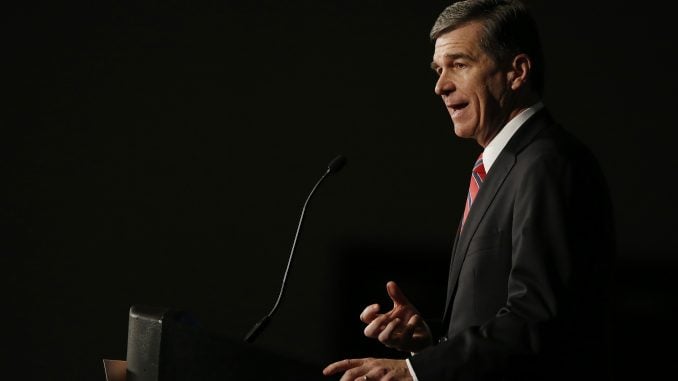
RALEIGH The beginning or introduction of a system, policy, or period such is the definition of inauguration. Despite taking the oath of office just after midnight on Jan. 1 and inclement weather raining (snowing) on his would-be inaugural parade, new Gov. Roy Cooper may have launched his agenda a few minutes into a Wednesday speech in which he laid out three pillars of his plan to take the North Carolina economy from “good to great.”The speech at the Economic Forecast Forum sponsored by the N.C. Chamber and N.C. Bankers Association served as a platform for Cooper to introduce policy proposals that he hopes will create jobs and grow the economy. Medicaid expansion, increased investments in education, and repealing the vexed House Bill 2, while not a novel grouping of policy goals from the Democrat, nonetheless stirred the political pot and signaled that the anticipated struggle of a newly divided government had begun in earnest.Cooper first expressed his intent to unilaterally expand Medicaid under the Affordable Care Act (ACA) via amendment to the State Medicaid Plan, presenting it as a way to spur billions in investment dollars and create thousands of new jobs as more federal tax dollars flow into the state.”We have to accept Medicaid expansion as being offered to our state,” said Cooper. “It will provide us significant investment. There’s a reason I’m saying this not at a health clinic, not at a hospital I am saying this at an economic forum because of the jobs it is going to bring, because it is fiscally responsible.”Under the ACA, a state can elect to expand Medicaid coverage with a federal promise to temporarily cover 95 percent of costs, while the remaining 5 percent must be covered by the state. Cooper proposed that state match be covered by North Carolina hospitals in lieu of taxpayers.While the N.C. Hospital Association communicated support for expansion of the entitlement eligibility standards, Cooper’s chosen method of going around the legislature by amending the State Medicaid Plan immediately raised the ire of state Republican lawmakers.”Just days into his term as governor, Roy Cooper already intends to violate his oath of office with a brazenly illegal attempt to force a massive, budget-busting Obamacare expansion on North Carolina taxpayers,” said Senate pro tempore Phil Berger (R-Eden) in a statement. “Cooper is three strikes and out on his attempt to break state law: he does not have the authority to unilaterally expand Obamacare, his administration cannot take steps to increase Medicaid eligibility, and our Constitution does not allow him to spend billions of state tax dollars we don’t have to expand Obamacare without legislative approval.”Republican legislative leaders have since penned a letter to the Centers for Medicare and Medicaid Services urging them to reject such an amendment request, citing state laws explicitly forbidding the maneuver as well as the N.C. Constitution.While Cooper’s estimated expansion would add around 650,000 people to Medicaid rolls, critics claim the true costs of expansion to taxpayers and those seeking medical services will burden the state in the future.Cooper campaigned on raising teacher salaries to the national average and reiterated that goal as sound economic policy, saying, “We want the budget to be aspirational.”While the economic experts in attendance Wednesday agreed that education investments are typically healthy for economic growth, the Republican super-majorities of the N.C. General Assembly control the purse strings and are open to mere suggestions from the executive branch.Lawmakers have prioritized education and teacher salaries over the past two budget cycles, increasing appropriations for both. However, the Republican majority’s emphasis on fiscally conservative budgets and account surpluses makes Cooper’s push to quickly reach the national average of teacher salaries a likely point of political contention as legislators gear up for unprecedented snap elections as a result of redistricting.Finally, the issue that drove much of Cooper’s campaign for governor will remain a hot topic after a failed repeal effort in late 2016. Cooper said repealing House Bill 2 will do much to repair the state’s image in the eyes of business considering investments in the Old North State.”As governor of this state, I will be an aggressive recruiter of good paying jobs,” said Cooper. “This election shows that North Carolina has a new face. North Carolina has sent the signal that it wants to be the state that welcomes everyone and that you should come here and open your business.”Cooper received applause from the audience of business leaders and the backing from the panel of economic experts on the repeal proposal, demonstrating a popular consensus for removing the law. That consensus, however, does not exist in the General Assembly as evidenced by the recent special session attempts to repeal H.B. 2 being squashed by Democrats and Republicans alike.The General Assembly convenes its 2017 legislative session on Wednesday to consider the budget, joining Cooper whose political term is already underway.




